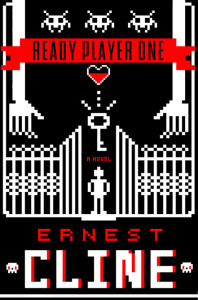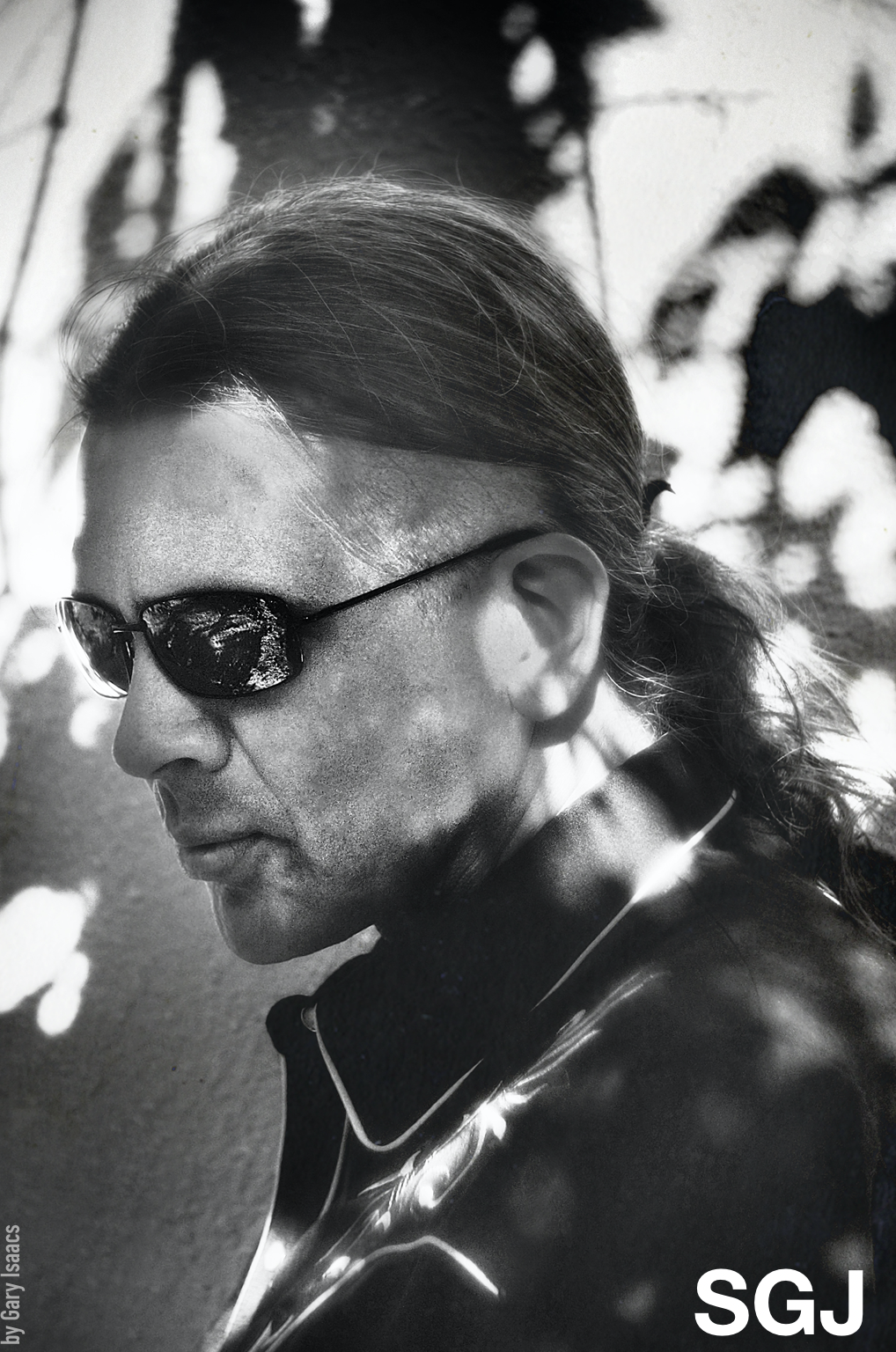I wonder what it’s like to read this if you’re not, say, exactly forty-two. Being forty-two, however (just like Ernest Cline), this was perfect. It rewards all the obscure trivia I prize, makes being into X set of movies and Y set of comics cool. And, it even goes what’s Z for me: videogames, which I don’t know as well as Ready Player One does. I mean, yeah, I haunted the arcades in the eighties like the rest of the world, knew Galaga (I’m even in a recent Galaga book) and Pac-Man and Joust and the rest, but I was never really a contender. My quarters always just lasted for a few minutes, never an afternoon. The arcade wasn’t the destination, for me, it was just the place you cruised between cruising all the other places. And, these text-based videogames Ernest Cline talks about—I mean, I’d seen a computer in junior high, I think, but never actually confronted one until a guy in my dorm had one in 1990. And it just sat there on a shelf, with its cassette-tape memory.
Still, the nostalgia Ready Player One summons up, it’s not nothing. Thomas Pynchon says we always have a certain fondness for the decade we were born in, right? I amend that to ‘the decade we came of age in.’ For me that was the eighties. It was every single movie and television show this novel dips into, and from—including Schoolhouse Rock. And Def Leppard’s even here, so, nothing to complain about, right?
Well, almost nothing. What Ready Player One neglects, Radio Shack gets right:
You see Chucky in there? Jason Voorhees? For my tastes, Ready Player One situates itself more with the science-fiction crowd than the horror crowd—and, the horror crowd was what drove the eighties. My eighties, anyway. However, Ready Player One‘s very structure is a videogame, so of course it makes sense to appeal to the crowd for whom videogames were the beginning and the end. And, at the arcade, there wasn’t just a whole lot of horror. We were still living under the CCA, I mean; of course our quarterdrop diversions would be bloodless.
Ready Player One hardly neglects fantasy, though, which was big in the early eighties. Krull, Beastmaster, Excalibur, Ladyhawke. There were even movies for the Barbarian Brothers. And the result of all this was that at the arcade you were either wielding a sword or a hyperspace button, pretty much. Hardly ever a machete—unless you opted for the pinball games. But pinball was always controlled by the slightly older set, who’d seen Zep in concert and believed in a completely different set of gods, thought Mötley Crüe and Poison were pretenders.
 Anyway, the story: there’s this kid in a dystopian future where the meat-world is secondary to the virtual-world of the OASIS (set-up reminds me of the Surrogates comic books, some). We’re automatically on this kid’s side just because the rest of his life seems to be against him: no real home, no parents, no money. He just has his avatar in the OASIS, has been bumming around with no credits until his obsessive eighties fascinations get him onto the trail of a legendary easter egg worth billions and billions. There’s friends and betrayals and a love interest, and there’s legit bad guys as well, and the whole OASIS is in peril, as it has to be. I mean, it’s a science fiction future, sure, but this is the boilerplate ‘chosen one’ story we all know from fantasy. And it completely works.
Anyway, the story: there’s this kid in a dystopian future where the meat-world is secondary to the virtual-world of the OASIS (set-up reminds me of the Surrogates comic books, some). We’re automatically on this kid’s side just because the rest of his life seems to be against him: no real home, no parents, no money. He just has his avatar in the OASIS, has been bumming around with no credits until his obsessive eighties fascinations get him onto the trail of a legendary easter egg worth billions and billions. There’s friends and betrayals and a love interest, and there’s legit bad guys as well, and the whole OASIS is in peril, as it has to be. I mean, it’s a science fiction future, sure, but this is the boilerplate ‘chosen one’ story we all know from fantasy. And it completely works.
And, the hard part? It’s what Michael Mann says was the trick with Blackhat: making someone writing code actually exciting. Basically, with Ready Player One, we’re looking over people’s shoulders as they play videogames. It’s not like Neuromancer or Tron where we’re in the system, quite, it’s—it’s a lot more like watching someone play with their action figures, I guess. Or, it can be. That’s the danger. But Ready Player One manages to avoid this. As for how? I think it’s just that the dystopia this meat world is makes us want to look into the virtual world. Just like everybody else.
Ready Player One has an even bigger issue to try to get around, though: reconciling all this eighties nostalgia with the target audience, which I’m taking to be . . . people born after the eighties were over? The age of the protagonist and the shape and tone of the story suggest this is YA, anyway. And, I’m not saying you can’t have smart, clever, capable kid-protagonists—for some reason I always think King Dork opened the door for this ‘new’ type of YA—I’m just saying that appealing to the taste and memories of those of us born in ’72 seems a gamey proposition, when the book’s being marketed to our kids, pretty much. Nevertheless, we found this book, right? And, I mean, The Big Splash, say. Remember that one? It’s a completely intelligent, hilarious send-up/parody of the private-eye novel, complete with noir-y lines and water-gun ‘violence’ and all of it. Yet it’s definitely YA. Meaning here’s a book poking fun at a genre its audience is oblivious to, which makes me ask who’s this joke for, finally?
But, yes, the data seems to be indicating that “YA” doesn’t mean only the kids are reading it. And I’m part of that, definitely; I inhale all the YA books I can, just because it’s refreshing to read books with all the boring parts not just taken out, but maybe never even included in the first place. So-called ‘adult’ fiction should take notice.
Anyway, reading Ready Player One, what really gets to me is how far we’ve come since Hyperion, which I consider about as good as science fiction gets. Well, okay: Hyperion and Solaris. Okay, and The Diamond Age too, maybe. And a lot of Vonnegut and all of PKD. Anyway, I keep feeling like The Fifth Element and its cousins somehow injected their blood into what had been Clarke and Asimov’s domain. Scalzi’s stuff seems to be infused with it anyway (and more—don’t mean to diminish Redshirts or Android’s Dream or any of them, or cast them as derivative). So, from Hyperion to Ready Player One: I can’t begin to fathom how we can start at one, end at the other. As to how to get from Hyperion to Altered Carbon: that makes perfect sense (one’s epic, one’s detective, but they’re definitely cousins). But the proof of how to get from Hyperion to Ready Player One, of course, it’s that we have. Wonder if we’re going to wrap back around to Hyperion kind of stuff here in America, though? Or, I wonder if a lot of current science fiction (in America) is kind of comic in tone as defense mechanism in response to the suspicion that our current world is science fiction of a sort? Does a comic slant insulate a novel from becoming immediately dated? As for where this starts, man, there’s readers much more in the know than me. Earliest I can think of is Steven Brust’s Cowboy Feng’s Space Bar and Grille (1990), but of course let’s not forget what Adams and Pratchett brought to the table. And let’s not forget that David Wong’s doing very similar things, just, with and to horror. And could be Carl Hiaasan’s playing that same game with the mystery.
What I do know is we’re getting less serious fare lately, it seems. And I’m not at all complaining about that. Redshirts, say? It’s a joke of a premise that’s then beautifully executed, and it’s got an emotional punch that hits harder than a lot of the ‘serious’ books I’ve read. More than any other novel, I suppose, it reminds me of Holes.
Anyway, I got no definitive answers. Just questions. Always with the questions. And, all I really meant to say was that I really, really dug Ready Player One. And I miss Hyperion, sure, but if you stay in one place too long, you sink, I know, and I’d never want that for science fiction. Science fiction is what’s going to get us to the stars, after all. We’ve got to make sure it thrives.
So: more like this, please, yes. I finally read something on the page that approximates this old beauty:
https://www.youtube.com/watch?v=4WgT9gy4zQA


 is the NYT bestselling author of 30 or so books, +350 stories, some comic books, and all this stuff here. He lives in Boulder, Colorado, and has a few broken-down old trucks, one PhD, and way too many boots. More
is the NYT bestselling author of 30 or so books, +350 stories, some comic books, and all this stuff here. He lives in Boulder, Colorado, and has a few broken-down old trucks, one PhD, and way too many boots. More